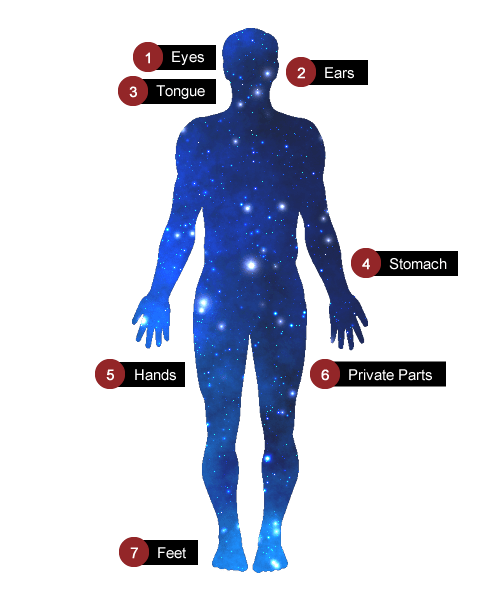Sins of the Private Parts
Introduction
By controlling our sexual desires it will certainly save us from great harm in this world and the next.
“Whoever guarantees me (the chastity of) what is between his legs ( i.e. his private parts), and what is between his jaws ( i.e., his tongue), I guarantee him Paradise.”
Summary of Sins to Avoid
- Adultery
- Keeping it unclean
- Keeping it uncovered
- Playing with private parts
Explanation of the Sins
1. Adultery
Allah ﷻ says, “And come not near to unlawful sex. Verily, it is a Faahishah” (i.e. anything that transgresses its limits: a great sin, and an evil way that leads one to Hell unless Allah ﷻ Forgives him) Quran 17:32
Thus, Islam not only prohibits zina, but also closes all the avenues and means leading to it. This is achieved by prohibiting every step and means leading to stimulating desires, opening ways for illicit sexual relations between men and women and promoting indecency and obscenity.
And the Prophet ﷺ said: “Every son of Adam has his share of zina. For the eyes may commit zina and their zina is looking; the hands may commit zina and their zina is touching; the feet may commit zina and their zina is walking; the mouth may commit zina and its zina is kissing. The heart desires and wishes and the private parts confirm that or deny it.” al-Bukhaari, Muslim, and Ahmad.
2. Keeping it unclean
It is sunnah to remove pubic hair which is defined as the hair that grows around the private parts. The sunnah for a man is to shave it and for a woman is to pluck it (if she is able to bear this), but the basic sunnah is fulfilled whether it is shaved or plucked. It is offensive to delay its removal when needed and more offensive to delay it beyond forty days.
3. Keeping it uncovered
The Prophet ﷺ said: “Guard your awrah, except from your wives or those (slaves) whom your right hands possess.” Abu Dawood.
The reason why such exposure is forbidden in Islam is due to the fact that haya (shyness) is the most fundamental trait of character in Islam, which all Muslims must nurture and safeguard at any cost.
The Prophet ﷺ said, “One of the most abiding legacies of the ancient Prophets is, “If you have no shame, do whatever you will”, He also said, “Being shy is a branch of faith”. Therefore, a believer is instinctively shy of exposing himself/herself in front of anyone other than one’s lawful partner. The Prophet ﷺ said, “Guard your private parts and keep them covered except from your own spouse.”
While Haya should push us away from exposing ourselves in front of strangers, there should be no such Haya in front of one’s marriage partner as there is no need for any inhibitions in seeking legitimate sexual fulfilment through one’s marriage partner.
Islam celebrates sexuality within the bounds of marriage. Thanks to Islam’s positive view of sexuality, it considers conjugal union between the spouses as an act of worship; thus the Prophet ﷺ “You have rewards of charity in your intimate union with your spouse!” When the companions enquired, “How can we be getting rewards for fulfilling our carnal desires?” He replied, “What if he/she were to fulfil it through illicit union; will they not be punished? They said, “Of course”; then He said, “Likewise, when they do it within the bounds of marriage, they will be rewarded.”
4. Playing with private parts
Masturbation is sinful, being prohibitively disliked, and having many personal and societal ill-effects that are known and recognised in sane traditional societies and by balanced people the world over. The early Muslims used to say, “The one who weds his hand is accursed.” Fath al-Qadir.
It is only allowed in the very rare situation where if the person did not do this, they would fall into actual zina (i.e. unlawful sexual intercourse), because of their uncontrollable desire, on condition that they are unable to marry and have taken all reasonable means to lessen their passion such as fasting, lowering their gaze, avoiding meat and dairy products, avoiding those things that stir their desires, such as bad company, spending unnecessary time outdoors, especially in public places such as shopping malls where there is fitna, avoiding watching TV and surfing the internet, etc.


